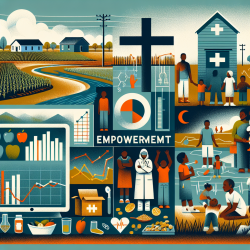Introduction
In the realm of speech-language pathology, understanding the socio-economic factors that influence health outcomes is crucial. The research article, Thinking Aloud About Poverty and Health in Rural Mississippi, sheds light on the intricate relationship between poverty and health, particularly in rural areas. This blog aims to inspire practitioners to harness this knowledge, improve their skills, and ultimately create better outcomes for children in similar settings.
The Intersection of Poverty and Health
Poverty and health are interlinked in a cyclical relationship where one exacerbates the other. In Mississippi, one of the poorest states in the U.S., this relationship is particularly pronounced. The research highlights that poverty leads to poor health due to factors like inadequate education, limited access to quality healthcare, and poor nutrition. These conditions are further exacerbated by job losses, reduced household incomes, and a lack of health insurance.
Implications for Practitioners
For speech-language pathologists and other healthcare practitioners, understanding these dynamics is critical. Here are some actionable insights derived from the research:
- Holistic Approach: Consider the socio-economic background of your clients. Understanding their environment can provide context for their health issues and help tailor interventions more effectively.
- Community Engagement: Engage with the community to understand their needs better. Collaborating with local organizations can help in designing interventions that are culturally and contextually relevant.
- Advocacy and Policy Influence: Advocate for policies that address the root causes of poverty. By influencing policy, practitioners can help create systemic changes that improve health outcomes.
Encouraging Further Research
The research underscores the need for ongoing investigation into the socio-economic determinants of health. Practitioners are encouraged to contribute to this body of knowledge by conducting studies that explore the impact of poverty on health in their own communities. Such research can inform practice and policy, leading to more effective interventions.
Conclusion
Addressing the challenges of poverty and health in rural Mississippi requires a concerted effort from public health professionals, policymakers, and practitioners. By implementing the insights from this research, practitioners can enhance their skills and make a significant impact on the lives of children in impoverished communities. To read the original research paper, please follow this link: Thinking Aloud About Poverty and Health in Rural Mississippi.










